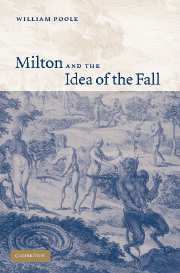Book contents
- Frontmatter
- Contents
- Acknowledgements
- Note on the text
- List of abbreviations
- Introduction
- Part I Fallen culture
- Part II Milton
- 7 Towards Paradise Lost
- 8 Paradise Losti: the causality of primal wickedness
- 9 Paradise Lostii: God, Eden and man
- 10 Paradise Lostiii: creation and education
- 11 Paradise Lostiv: Fall and expulsion
- Conclusion
- Notes
- Index
7 - Towards Paradise Lost
Published online by Cambridge University Press: 10 December 2009
- Frontmatter
- Contents
- Acknowledgements
- Note on the text
- List of abbreviations
- Introduction
- Part I Fallen culture
- Part II Milton
- 7 Towards Paradise Lost
- 8 Paradise Losti: the causality of primal wickedness
- 9 Paradise Lostii: God, Eden and man
- 10 Paradise Lostiii: creation and education
- 11 Paradise Lostiv: Fall and expulsion
- Conclusion
- Notes
- Index
Summary
Milton's early schooling and exposure to the Church were rigorous. Richard Stock, the minister of the local church All Hallows, catechised ‘at certaine times in the weeke dayes’ all the parish boys one day, and the girls another. A zealous reformer, Stock preached twice every Sunday, and liked citing Church fathers, particularly Augustine, to whom he refers rather obsessively in his printed work. The chapter ‘Of the hatred of God’ in his posthumous Stock of Divine Knowledge – bad pun – affirms a strongly Calvinist emphasis upon restricted Atonement: God ‘denies the grace of election to most: there are but a few that have favour’. Milton's private tutor Thomas Young taught him the classics and perhaps some patristics; at St Paul's, John Colet's statutes emphasised Christian learning, encouraging the study of such authors as Lactantius and Prudentius, though how far such statutes were implemented is uncertain.
St Paul's, though, was under the headship of Alexander Gil, who espoused a rationalistic Christianity, opening his Sacred Philosophie of the Holy Scripture with an appeal to reason, ‘The principall virtue of mans soule’. Gil did subordinate reason to faith, but not dichotomously so, rather seeing faith under constant interrogation by reason:
[F]aith, opinion, and supposition, are of larger compasse, one than another, and all of greater circuit than reason. Yet because imagination that lovely Dalilah is ever serviceable to reason her Samson, though never faithfull; and because there is nothing in any of these three, which the imagination dares not be busie with; therefore by the help of imagination, reason inquires into the workes of all these, using thereto saying and gain-saying, likelyhood and unlikelyhood, and arguing on every side, till it come to a conclusion, in which it will rest, at least for a time.
- Type
- Chapter
- Information
- Milton and the Idea of the Fall , pp. 125 - 145Publisher: Cambridge University PressPrint publication year: 2005

